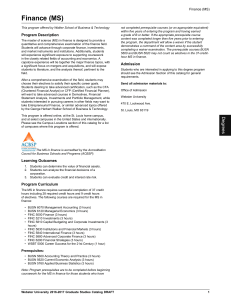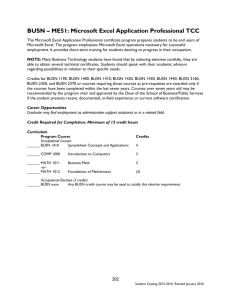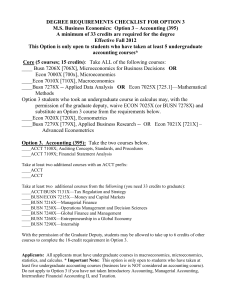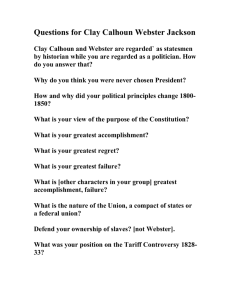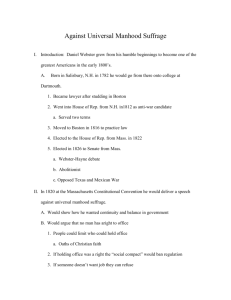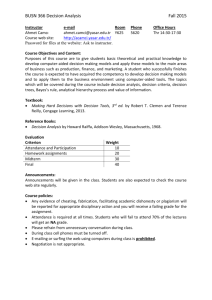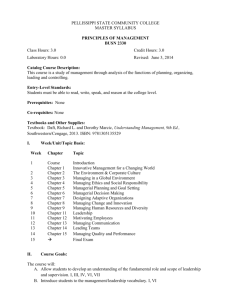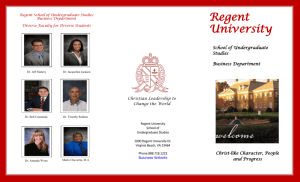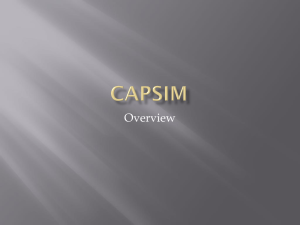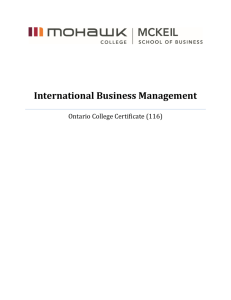master of business administration
advertisement
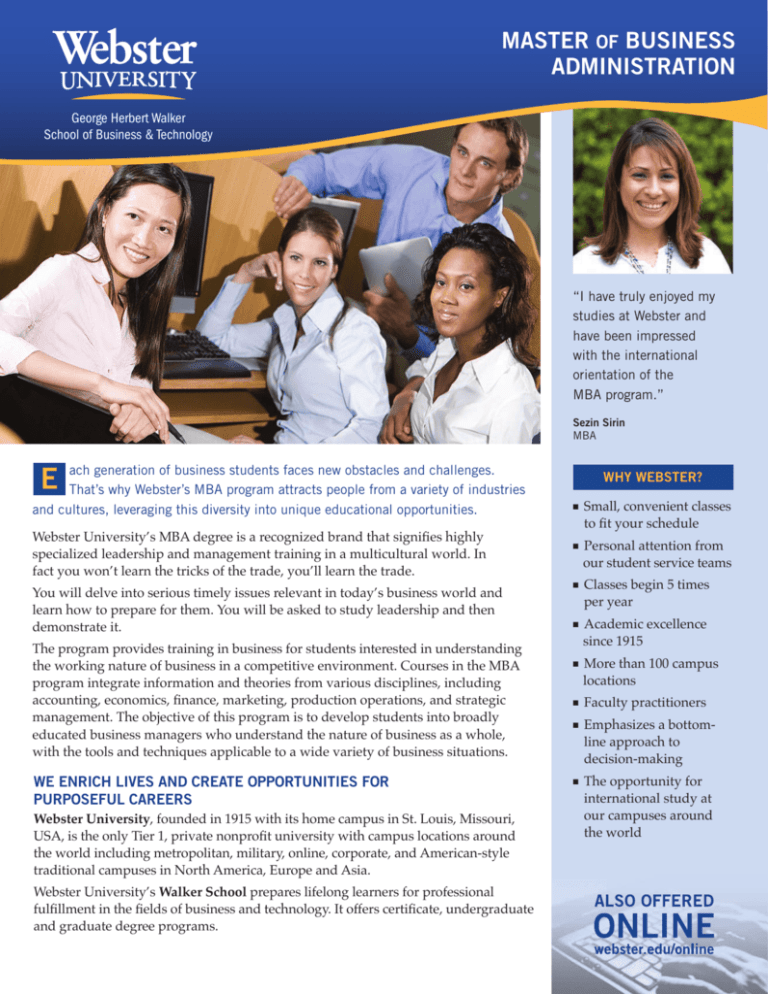
MASTER OF BUSINESS ADMINISTRATION George Herbert Walker School of Business & Technology “I have truly enjoyed my studies at Webster and have been impressed with the international orientation of the MBA program.” Sezin Sirin MBA E ach generation of business students faces new obstacles and challenges. That’s why Webster’s MBA program attracts people from a variety of industries and cultures, leveraging this diversity into unique educational opportunities. Webster University’s MBA degree is a recognized brand that signifies highly specialized leadership and management training in a multicultural world. In fact you won’t learn the tricks of the trade, you’ll learn the trade. You will delve into serious timely issues relevant in today’s business world and learn how to prepare for them. You will be asked to study leadership and then demonstrate it. The program provides training in business for students interested in understanding the working nature of business in a competitive environment. Courses in the MBA program integrate information and theories from various disciplines, including accounting, economics, finance, marketing, production operations, and strategic management. The objective of this program is to develop students into broadly educated business managers who understand the nature of business as a whole, with the tools and techniques applicable to a wide variety of business situations. WE ENRICH LIVES AND CREATE OPPORTUNITIES FOR PURPOSEFUL CAREERS Webster University, founded in 1915 with its home campus in St. Louis, Missouri, USA, is the only Tier 1, private nonprofit university with campus locations around the world including metropolitan, military, online, corporate, and American-style traditional campuses in North America, Europe and Asia. Webster University’s Walker School prepares lifelong learners for professional fulfillment in the fields of business and technology. It offers certificate, undergraduate and graduate degree programs. WHY WEBSTER? ■ ■ ■ ■ ■ ■ ■ ■ Small, convenient classes to fit your schedule Personal attention from our student service teams Classes begin 5 times per year Academic excellence since 1915 More than 100 campus locations Faculty practitioners Emphasizes a bottomline approach to decision-making The opportunity for international study at our campuses around the world PROGRAM CURRICULUM CORE COURSE DESCRIPTIONS The MBA degree requires completion of 30 credit hours of the MBA core curriculum and 6 credit hours of electives. Students may choose to complete an emphasis with 48 total credit hours of the new Global Track with 42 total credit hours. MRKT 5000 Marketing (3) Students examine the character and importance of the marketing process, its essential functions, and the institutions exercising these functions. Course content focuses on the major policies that underlie the activities of marketing institutions and the social, economic, and political implications of such policies. Visit our online catalog: www.webster.edu/gradcatalog. Core Courses ■ ■ ■ ■ ■ ■ ■ ■ ■ ■ MRKT 5000 MNGT 5590 MNGT 5990 BUSN 5760 FINC 5000 FINC 5880 BUSN 6070 BUSN 6110 BUSN 6120 BUSN 6200 Marketing Organizational Behavior Corporate Responsibility and Society Applied Business Statistics Finance Advanced Corporate Finance Management Accounting Operations and Project Management Managerial Economics Strategy and Competition Prerequisites ■ BUSN 5000 Business ■ BUSN 5600 Accounting Theory and Practice ■ BUSN 5620 Current Economic Analysis AREAS OF EMPHASIS Students may choose to add an area of emphasis in: Business and Organizational Security Management, Decision Support Systems, Environmental Management, Finance, Gerontology, Human Resources Development, Human Resources Management, Information Technology Management, International Business, International Relations, Management and Leadership, Marketing, Media Communications, or Procurement and Acquisitions Management. THE MBA - GLOBAL TRACK The MBA - Global Track offers a real opportunity for students to gain an in-depth familiarity with the global business marketplace. The program requires a minimum of 42 credits which include 12 hours of international-focused coursework. Additionally, the program incorporates options for a (required) international experience course: an overseas graduate level course or a Global Hybrid course involving one week of international experience and corporate visits. the Walker Travel Award is available to assist qualified students. YOUR NEXT STEP Students who have earned a bachelor’s degree from a regionally accredited four-year college or university are eligible to apply for admission to Webster University’s graduate programs. Now’s the time to call or visit to learn how Webster University can meet your educational needs. Please contact 314-246-7800 or gadmit@webster.edu. For more information about our graduate programs, or to apply online, visit: webster.edu. Webster University is accredited by the Higher Learning Commission and is a member of the North Central Association, 312-263-0356, www.ncahlc.org. The George Herbert Walker School of Business & Technology is accredited by the Accreditation Council for Business Schools and Programs (ACBSP) for BS, BA, MBA, MA, MS, and doctoral programs in the business and management departments. MNGT 5590 Organizational Behavior (3) This course introduces students to many of the basic principles of human behavior that effective managers use when managing individuals and groups in organizations. These include theories relating to individual differences in abilities and attitudes, attribution, motivation, group dynamics, power and politics, leadership, conflict resolution, organizational culture, and organizational structure and design. MNGT 5990 Corporate Responsibility and Society (3) Students examine how and why public demands on private business have expanded and altered during the twentieth century and how business has moved to anticipate and adapt to these emerging demands. The concept of corporate responsibility leads to a host of complex management problems that are assessed in light of the new role of business in contemporary society. BUSN 5760 Applied Business Statistics (3) The student examines the application of statistical analysis, hypothesis testing, and regression analysis in business decision making. The course should focus on the utilization of statistical methods as applied to business problems and operations. FINC 5000 Finance (3) The student examines the general nature of financial management, the American financial system, taxes, and the major financial decisions of corporations. Specific attention is given to present value and capital budgeting; risk and asset pricing; financial analysis and forecasting; financial decisions and market efficiency; and capital structure. Problemsolving methodology is used to illustrate the theories and tools in financial decision-making. FINC 5880 Advanced Corporate Finance (3) This advanced study of corporate financial analysis and planning includes capital budgeting, cost of funds, and capital structure and valuation. Selected topics that may be covered are leasing, mergers, takeovers, business failure, reorganization, and liquidation. Problem-solving and case study methodologies are used to illustrate theories and techniques helpful in financial analysis and planning. BUSN 6070 Management Accounting (3) The student examines advanced topics in management accounting as these relate to management information needs for planning, control, and decision making. Topics include interpretation of standard cost variances; application of quantitative techniques; evaluation of divisional performance; activity-based costing; and the behavioral impact of accounting systems. BUSN 6110 Operations and Project Management (3) This is a course that focuses on the major managerial issues in manufacturing management and the tools that can be used to manage them. Special attention will be given to project management, including PERT, critical path scheduling, and time-cost models, in operations management and other business settings. The major operations management issues are quality management and control, capacity management, plant location, layout and design, production planning and scheduling, supply chain management, and inventory management. The analytical tools covered include queuing theory, statistical quality control, linear programming, and learning curves. BUSN 6120 Managerial Economics (3) The student examines the application of microeconomic theory as applied to the managers’ responsibilities within the organization. This course should emphasize the quantitative and qualitative application of economic principles to business analysis. BUSN 6200 Strategy and Competition (3) The student examines the conceptual and practical aspects of business policies and policy decision making by utilizing all the concepts, theories, and tools that were presented in the previous courses. The student should be able to analyze and recommend a comprehensive and workable approach to the situation.
